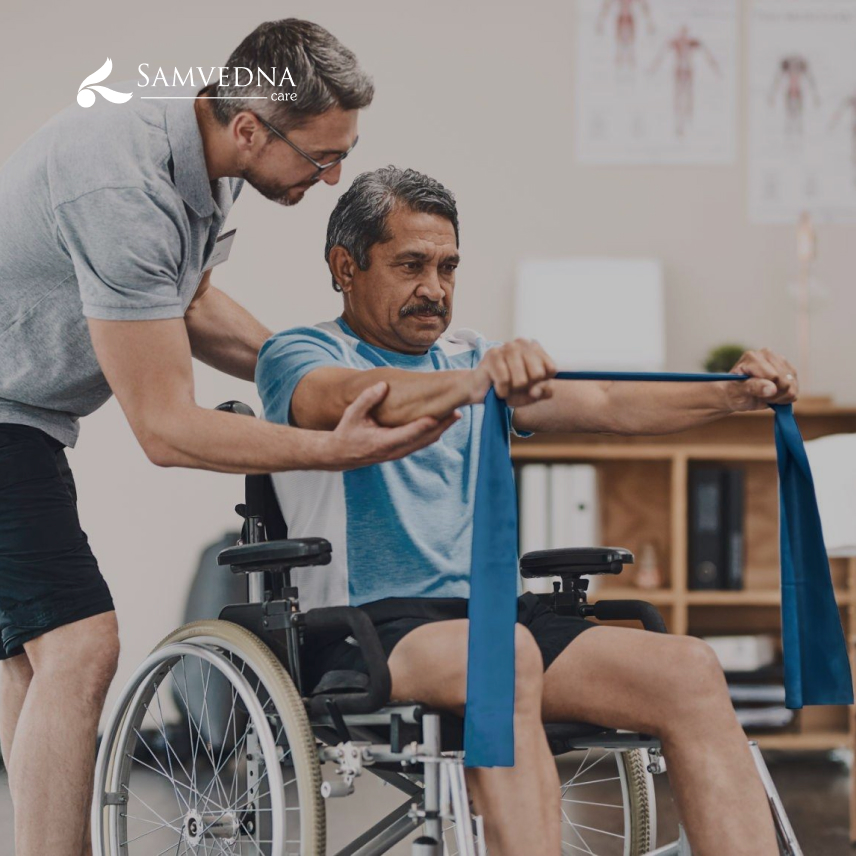[ad_1]

A stroke is a medical condition that occurs when a sudden disruption in the blood supply to a part of the brain. When the brain doesn’t receive enough blood and oxygen, brain cells can be damaged or die, leading to various physical problems, including difficulty speaking or slurred speech, sudden numbness or weakness often on one side of the body, and loss of coordination. Often overlooked, the emotional and behavioral changes accompanying a stroke can significantly affect a patient’s quality of life.
The aftermath of a stroke can be particularly challenging for the elderly; the impact of a stroke can be even more profound due to the specific vulnerabilities and challenges that come with aging. Samvedna Care, focusing on comprehensive elderly care, recognizes the significance of addressing a stroke’s physical and emotional aftermath. The dedicated team of Mental health therapists at Samvedna Care is adept at understanding the unique needs of elderly stroke survivors and tailoring their interventions accordingly.
The Silent Toll of Stroke
Despite advancements in stroke treatment and rehabilitation, stroke’s emotional and behavioral toll remains largely under-recognized. Survivors frequently grapple with many emotional disturbances, including anxiety, depression, anger, and a sense of helplessness. The sudden disruption of normal life, coupled with the fear of disability, can lead to overwhelming emotional distress. Moreover, the physical limitations post-stroke, such as difficulty in speaking or moving, can give rise to feelings of frustration and isolation, exacerbating the psychological burden.
Role of Mental Health Therapists
In stroke recovery, mental health therapists serve as a guiding light, offering invaluable support to patients and their families. Their specialized training enables them to navigate the complexities of post-stroke emotional challenges. They can identify underlying issues and formulate tailored intervention strategies by conducting thorough mental health assessments. These interventions often encompass a combination of counselling, cognitive-behavioral therapy, and holistic approaches aimed at fostering emotional resilience and improving overall well-being.
Empowering Emotional Resilience
While the road to emotional recovery post-stroke may seem daunting, mental health therapists adopt a multifaceted approach to empower emotional resilience. Through psychoeducation, patients are educated about the emotional ramifications of stroke, fostering a sense of understanding and acceptance. Therapists also integrate cognitive-behavioral techniques to address maladaptive thought patterns, instilling coping mechanisms that facilitate emotional adaptation and resilience. Group therapy sessions and support groups further foster a sense of community and understanding, enabling patients to share experiences and glean strength from one another.
Involvement of Caregivers and Family
The impact of a stroke is not confined solely to the survivor; it extends to caregivers and family members, who often face significant emotional upheavals of their own. Mental health therapists recognize the integral role of caregivers in the recovery process and provide them with necessary support and guidance. Therapists facilitate open communication by incorporating family therapy sessions, enhancing understanding and empathy within the familial support system. Empowering caregivers equips them with the tools to navigate the challenges of providing care, fostering a conducive environment for the patient’s emotional rehabilitation.
Holistic Approach to Recovery
Recognizing that emotional well-being is intricately intertwined with physical recovery, mental health therapists collaborate with interdisciplinary teams to ensure a holistic approach to stroke rehabilitation. By fostering communication between neurologists and other healthcare professionals, they create a comprehensive support network that addresses the multifaceted needs of stroke survivors. This integrated approach not only facilitates a smoother recovery process but also enhances the overall quality of life for the patient.
The aftermath of a stroke goes beyond physical limitations; it encompasses a complex interplay of emotional and behavioral challenges that demand attention. Through their adept understanding and specialized interventions, mental health therapists play a pivotal role in unraveling the silent toll of a stroke. By conducting meticulous mental health assessments and offering tailored therapeutic interventions, they pave the way for emotional resilience, empowering survivors to navigate the challenges of post-stroke life with strength and determination. In the realm of stroke recovery, the role of mental health therapists is not just complementary but essential in fostering a holistic path to healing.
Samvedna Care recognizes the multifaceted needs of elderly stroke survivors. They offer comprehensive elderly care services, including physical rehabilitation and mental health support. Their approach to elderly care is holistic, addressing recovery’s physical, emotional, and behavioral aspects. Whether it’s physical therapy to regain mobility or mental health therapy to cope with emotional challenges, Samvedna Care is there every step of the way.
[ad_2]
Source_link

